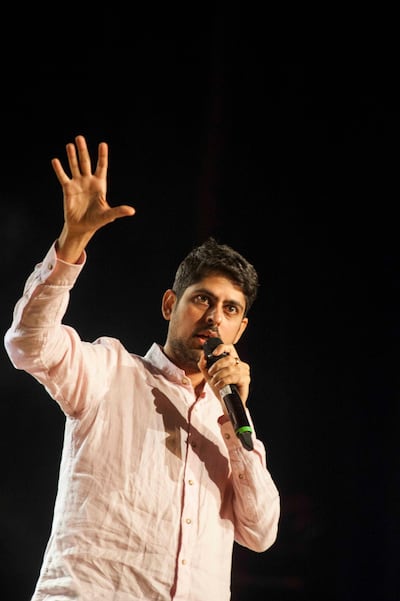On July 26, 2005, comedian, screenwriter and lyricist Varun Grover, made his television debut as a credited writer on The Great Indian Comedy Show. It was also the day Mumbai suffered catastrophic flooding that killed more than 1,000 people. Grover, 39, spent half the day trying to walk back home, which proved impossible. "I spent the night in a bus half-crushed by a tree," he recalls, "with no food, no money, no cellphone coverage."
The story he narrates is one of sorrow for the thousands who lost homes, lives and loved ones, but also for missing out on the live telecast of a milestone in his career. But it probably set the tone for what was to come.
'These are apocalyptic times'
These days, he is courting critical success in an India – and world – that he believes is fast-regressing. "These are apocalyptic times," he says. "I've stopped many things such as healthy eating. What's the point? In this post-truth era, I feel increasingly powerless."
This sentiment prevails, he says, through season two of Netflix's Sacred Games, out on Thursday August 15, on which he serves as lead writer. "We've been very ambitious with this season in terms of scale and the philosophical arc," says Grover. "Is the world really worth saving?" This question is at the heart of this season.
Grover's passion for the arts developed from an early age, thanks to his father. Grover Senior worked in India's military engineering services, so Grover spent his childhood moving from one city to another. His father was always inclined towards the arts and he passed down an abiding love for books to his sons.
Even though Grover graduated in engineering and worked for a year in a software company, his passion for writing grew exponentially. In 2004 he moved to Mumbai, with just enough savings to last him a year of struggle. "I could have taken up the screenwriting programme at FTII Pune [India's most prestigious film school] but I chose to build my skill in the real world," he says.
Grover had 'no interest' in offending the oppressed
It has been an interesting and fulfilling journey. Until 2009, Grover thrived on a spate of successful TV comedy shows where political satire, film spoofs and social commentary were par for the course. But the rich and powerful grew increasingly uncomfortable with, and sensitive to, being mocked, thus changing the face of Indian comedy to what it largely is today. "Comedy was still offensive, only this time to the oppressed – women, the disabled, lower classes," says Grover. "I had no interest in such content. I felt quite lost at the time."
He then entered an open-mic contest hosted by actor and comedian Vir Das, which he won. "That was the first time I realised I was a performer, too." Eventually, Grover brought his brand of incisive comedy to stand-up, launching the popular show Aisi Taisi Democracy (he has performed more than 70 of them). Grover, however, is unique in that he writes serious songs and screenplays that are equally compelling, yet a far cry from funny.
In 2012, he turned lyricist for acclaimed director Anurag Kashyap, writing songs for films such as That Girl in Yellow Boots, Gangs of Wasseypur (1 and 2), Ankhon Dekhi and Dum Laga Ke Haisha. He won the National Film Award for Best Lyrics for Dum Laga Ke Haisha, and went on to write songs for more cult movies, including Udta Punjab, Newton and Sui Dhaaga. Grover also started writing screenplays, beginning with the award-winning Masaan, which was released in 2015.
The best way to maintain balance
His next film is Sandeep Aur Pinky Faraar, directed by Dibakar Banerjee.
How does he switch roles so effortlessly? "I like to dissociate myself from the person I was even three hours ago," he says. "It's a natural requirement to be a writer."

Grover says he is unable to respond to people who praise his work because he disengages completely. "Creation happens on multiple levels. Everyone has their own Masaan." His way of maintaining balance and focus is to detach from success and the idea of having an impact.
As a veteran Indian comedian, Grover is critical of his country's comedy scene but has hope, considering the number of comediennes topping the charts today. "There's a lot of ordinariness, and people tend to play to the same regressive tropes – sexism, patriarchy, unkindness to the oppressed," he says. "Comedy shouldn't fall into these traps – by its very nature comedy is supposed to be edgy and anti-establishment. But the industry is properly just about seven years old here. In another seven years things will change more, and non-Hindi comedians will also find a place."
Grover's work is of greater significance today than ever considering how any criticism of the government in India is construed as being anti-national. Dissenters consistently face incessant trolling and threats – fellow comedian Kunal Kamra, who recently performed in Dubai, even faced eviction back home – and there's a general atmosphere of hostility towards any form of criticism against the current administration and the ruling political party. The regressive rhetoric that's rampant across Indian society now has heightened sensitivity towards criticism of any of its ills, such as patriarchy or communalism.
“I’m fine with threats, but there is a looming threat of violence,” says Grover. “We just need to be cleverer instead of curtailing our speech. We’re doing fine, but it takes one bad day to turn everything upside down.”
Varun Grover will perform his stand-up show Vichitr Kintu Satya (Strange But True) at Laugh-a-Thon 3.0 on Friday at Theatre by QE2 in Dubai



